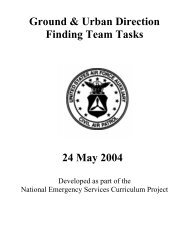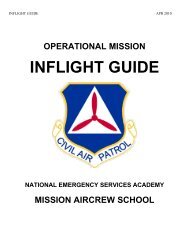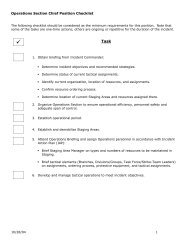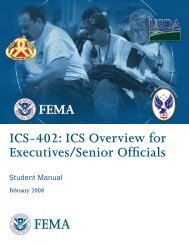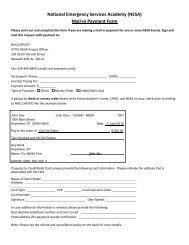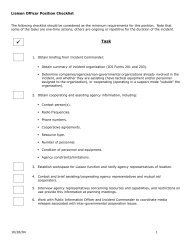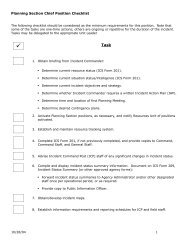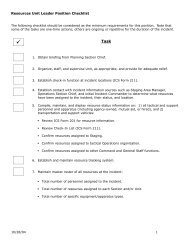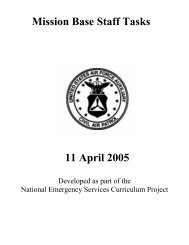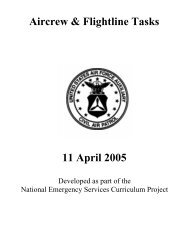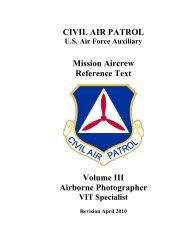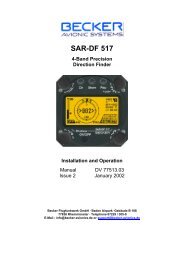MART Vol. II MO/MP - NESA - Civil Air Patrol
MART Vol. II MO/MP - NESA - Civil Air Patrol
MART Vol. II MO/MP - NESA - Civil Air Patrol
You also want an ePaper? Increase the reach of your titles
YUMPU automatically turns print PDFs into web optimized ePapers that Google loves.
about fuel status at least once an hour, or before departing on each leg orsortie. Are the winds as predicted, or are you facing a stronger-thanexpectedheadwind? Is your power set at economy cruise, as youplanned, or have you gone to full power because you're running late? Didthe last leg take as long as you had planned, or did ATC put you in thenorth forty for 30 minutes for "traffic separation"?How do you describe a pilot who stretches his fuel to save the 20-30 minutes ittakes to land and refuel, or a pilot who lands and refuels just because she wasn'tcomfortable with her fuel situation? The first is an incompetent pilot who's willing torisk himself, his passengers and the aircraft for some perceived "macho" image of adaring pilot. The second is a CAP Mission SAR/DR Pilot.• If in doubt, land and refuel! Just in case, land and refuel!9.2.4 Unfamiliar <strong>Air</strong>craft EquipmentCAP aircraft are not equipped uniformly. If you are assigned to anotheraircraft than the one you usually fly, check the equipment.• If you don't know how to set up and operate the aircraft's GPS, you won'tbe able to use it correctly; if you try to learn "on the fly" you will spend toomuch time with your head inside the aircraft instead of looking outside.The same reasoning applies to the Audio Panel, FM radio, and DF unit.• Even something as simple as an unfamiliar Navaid can affect safety. Inmost cases, just spending some time sitting in the aircraft and going overan unfamiliar com radio or transponder will suffice. But if you've neverused an HSI before, this isn't the time to learn.• What does the equipment in the baggage areas weigh? You need toknow this for an accurate weight and balance.• Whatever you do, don't try to bluff your way through. Tell someone andask for assistance. Another pilot can help you, or mission staff mayassign another pilot or experienced observer to your crew who knowshow to operate the equipment.9.2.5 Unfamiliar terrain and weatherCAP missions often require you to fly to a different part of the state, or to adifferent state altogether. While you will be flying the same type of searchpatterns and using many of the same techniques, the terrain may differconsiderably from you local terrain. Different terrain often is accompanied bydifferent weather patterns and conditions.Mission staff will brief you on local conditions, and may even give you trainingspecific to their area. But you need to arrive as prepared as possible. Inparticular, you need to ensure you have the proper clothing, equipment, andsurvival gear for both the terrain you are crossing and the terrain in which you willbe operating. What is required for one area can differ considerably from what youneed in another clime.157



